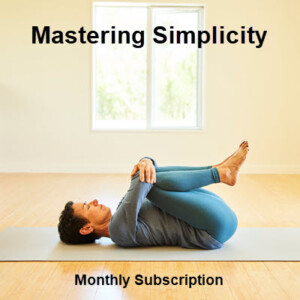Subtotal: $11.25
From Simon Says To Self-Sovereignty: Empowering People Through Interoception
$165.00
Most historic Yoga lineages and methods have relied on models for teaching that are hard wired to ensure the student’s dependence upon the teacher as the ultimate (and sometimes only) point of reference.
This pedagogic model has persisted within contemporary Yoga styles with new yoga hybrids simply filtered through the same archaic lens. Encapsulated in the phrase “Simon Says”, teachers are trained to deliver authoritative instruction with students striving to obediently replicate a posture or practice. This makes for students who become passive recipients of information rather than active participants engaged in shared inquiry and adaptive learning. This externally referenced model for teaching can gradually erode people’s ability to access and trust their own perception, kinesthesia and interoception.
Donna will explore the conscious steps teachers can make to create a context for students to become adept at investigating, deducting, adapting and evolving their yoga practice. We will learn about the conditions that foster people’s ability to perceive, process and integrate the signals from within their bodies.
Not only can this approach yield exceptional results for students; crossing the bridge from Simon Says to Self-Sovereignty teaching can make teaching a satisfying lifelong career.
This 12.5 hour online course is available as five 2.5 hour sessions. Each session will include an introductory lecture followed by a guided experiential practice intended to model shared-inquiry pedagogy. The experiential part of each session may include sitting meditation, Body Weather Reading, guided movement inquiry, and both active and passive gentle yoga practice. There will be time at the end of each session for questions and answers. To facilitate depth within our discussion there will be no partial attendance allowed.
Topics that will be covered:
Session One: A New Pedagogy for Teaching Yoga: This session will begin with a PowerPoint lecture where Donna will elucidate some of the central principles that underlie a shared-inquiry pedagogy. Using the more contemporary self-determined learning strategies enabled through a shift to Heutogogy (from the Greek verb “to discover”), we’ll look at how enhanced ability to inner reference can support autonomy and capability. We’ll
finish the session with several guided inquiries that foster a felt experience of whole body breathing.
Session Two: Rules versus Principles. Drawing on the work of Philip Shepherd, author of New Self, New World, this session will begin with a discussion about the difference between rules and principles and how a reorientation towards exploring principles can act as a springboard into limitless forms of integration. Donna will model how a singular principle can be explored in a 1.5 hour class designed to give you a direct experience of interoceptive learning.
Session Three: From Giving Answers to Posing Questions: The Language of Guided Inquiry. In this session we’ll cover:
- The language of guiding inquiry: from giving answers to posing questions.
- Balancing form and content, structure and exploration
- Strengthening the inquiry process by limiting what is explored.
- The power of pause, open exploration, and non-interference.
- Identifying limiting pedagogic assumptions (teacher knows best) and learning to see with “intelligent not-knowing”.
- Using the technique of “Body Weather Reading” to engage the student’s own navigational process.
- Donna will lead an experiential session where she will juxtapose old and new pedagogic strategies so that teachers can directly experience how one’s approach can either foster or suppress investigative learning.
Session Four: Using Templates for Kinesthetic Learning: Offering Student Stages of Inquiry, Progressive Points of Entry, and Layered Instructions. In this class Donna will demonstrate how the human developmental pattern of Navel Radiation can be used as a template for guided inquiry, offering each person the ability to choose which stage of inquiry is most relevant to their experience. We’ll also explore how progressive points of entry can allow different individual abilities and levels of experience to coexist happily in a group class.
Session Five: Planning Classes: Considering the Class Plan as an Artistic Process. Keeping classes fresh and engaging can be truly challenging, especially when working with students over many months and years. Working on and revising class plans can radically improve the skillfulness of your teaching. Donna will share the planning template she has used throughout her career as well as strategies and approaches to developing class material. In this session Donna will cover:
- The importance of self-practice as a resource for deep dive interoceptive learning.
- Implementing a class planning template that focuses on themes, building specific skills and progressive learning.
- Developing class structures that support cumulative learning and reward the most committed students.
- Using your yoga library as a resource for development of new classes and sequences – the importance of test-driving material first.
- Building confidence through having a plan, becoming adept at changing the plan.
- Going back to the drawing board: turning lemons into lemonade (AKA– from the class that crashed to the class that takes flight).
- Archiving template classes, workshops and intensives for future use.

 The Art and Science of Teaching Yoga
The Art and Science of Teaching Yoga 



